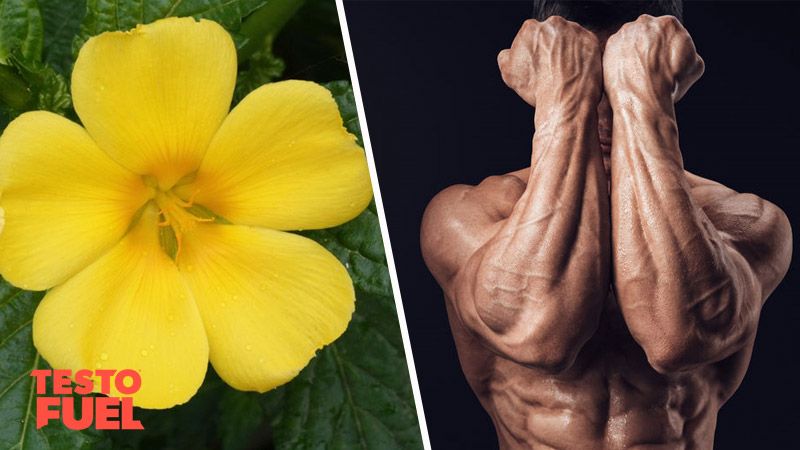TestoFuel Blog : Make Gains & Pack on the Muscle

There are many herbs, ingredients and nutrients that can support male health and boost testosterone. Get the rights ones and you’re well on your way to a bigger, better physique.
The problem is though that the supplement industry is full of cheap imitations that promise to fulfil your needs but just can’t deliver.
Damiana leaf is a Central American herb that has been used as an aphrodisiac for many years in tribal medicine – but does it actually boost testosterone or is it just another ingredient with false hope?
In this article we’ll take a look.
Damiana leaf is the more common name for the Turnera diffusa plant. It is native to Central America and has a long history of use for its herbal aphrodisiac properties in both Aztec and Mayan culture [1].
This small shrub from the Turneraceae family is characterized by its small and vibrant, aromatic flowers that blossom throughout summer. It has an aroma that is spice-like and is often used to flavor Mexican liqueurs such as margaritas.
The dried leaves of the plant are used to make Damiana supplement which is often sold as a diuretic, tonic and testosterone booster. According to Damiana – history of a herbal hoax, it was first marketed in the US back in 1976 as a cure for impotency. It was said to be ‘powerfully invigorating’ [2].
The leaves contain a number of bioactive compounds such as glycosides, caffeine and fatty acids. You’ll also find a range of high-concentration flavenoids which have been found to possess anti-cancer, anti-inflammatory and antioxidant properties [3]. They have also been found to act on sex hormone receptors too.
After the age of 30 your testosterone levels naturally fall and this makes it harder to properly balance androgen and estrogen levels. As you age, more of your available testosterone converts to estrogen via a process called aromatization – this leads to a reduction in total and free testosterone levels.
Once your T levels become clinically low you’ll suffer a drop in physical and sexual performance, a loss of strength and muscle mass, and a change in energy and mood.
Aromatase inhibitors are often used to maintain T levels and stop them from falling to clinically low levels. Damiana leaf contains two compound which have anti-aromatase properties:
Although touted as an aphrodisiac, there’s a surprising lack of research on this herbs sexual performance benefits. One animal study showed a boost in libido and performance in rats that were low on energy and sexually sluggish [5]. But it didn’t have any effect on healthy, sexually potent rats though – even at high doses.
The biggest potential benefit to enhanced testosterone is Damiana’s anti-aromatase properties. It makes sense that if this herb can reduce the conversion of T to estrogen then it could slow aromatization down.
This wouldn’t increase testosterone per se, but it would still be somewhat beneficial, particularly to those who have high estrogen levels such as older men, post-cycle bodybuilders or those with benign prostatic hyperplasia.
As we’ve already mentioned, research on this herb is limited. One study, published in the BMC Complimentary an Alternative Medicine journal [6], found that a supplement containing a number of different herb extracts (200 mg Damiana) had no effect on serum testosterone levels. There was also a fairly high drop off rate too, with 4 out of the 39 participants not wanting to continue to the end of the study.
This seems strange but Damiana could be both anti-estrogenic and estrogenic at the same time. Technically it would be classed as having estrogen mimetic qualities.
Whilst pinocembrin and acacetin could act as anti-aromatization compounds, another compound called apigenin might also be a weak estrogenic. Studies have found that at 250 mcg/mL, damiana leaf has a 9% efficiency as a phytoestrogen [1]. And that’s not good news.
In one large study of over 150 herbal supplements, Damiana was found to be in the top 6 highest of all progesterone receptor-binding herbs and spices, alongside licorice and oregano [7]. This means that it may amplify the effects of progesterone in the body such as fatigue, loss of libido and prostate enlargement.
TestoFuel is an exhaustively researched, natural testosterone booster that supports muscle growth, strength, recovery and energy.
As a top-of-its-game supplement, it contains only ingredients that have been shown to work in the most rigorous studies. Including active ingredients such as oyster extract and magnesium this is the best product you can choose.
TestoFuel is ideal for improving your performance both in and out of the gym, and helping you attain that all-important muscular physique.
Obviously it would be useful to see some high-quality, controlled studies using Damiana on human participants. One or two exist but are confounded with other bioactive compounds. Without investigating the ingredient on its own it is impossible to see whether or not it has any beneficial effects.
There is currently no clinical evidence that Damiana boosts testosterone levels whatsoever. It may have an anti-aromatase effect, but in the grand scheme of things this won’t necessarily elevate serum T levels.
If you are considering Damiana as a T-booster we strongly advise that you reconsider purchasing this herb and instead focus your attention to more clinically proven, natural ingredients that have a direct effect on your androgen levels.